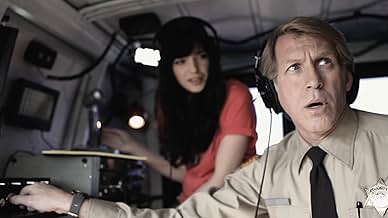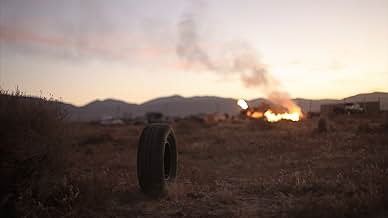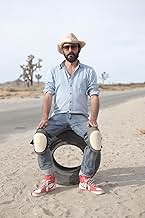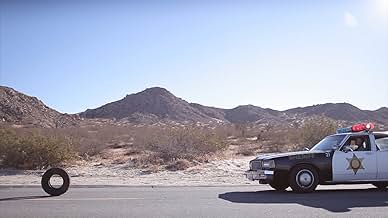Un pneumatico per auto omicida, scoprendo di avere un potere psionico distruttivo, punta gli occhi su una città deserta quando una donna misteriosa diventa la sua ossessione.Un pneumatico per auto omicida, scoprendo di avere un potere psionico distruttivo, punta gli occhi su una città deserta quando una donna misteriosa diventa la sua ossessione.Un pneumatico per auto omicida, scoprendo di avere un potere psionico distruttivo, punta gli occhi su una città deserta quando una donna misteriosa diventa la sua ossessione.
- Premi
- 5 vittorie e 3 candidature totali
- Black Woman
- (as Cecilia Antoinette)
- Zach
- (as Remi Thorne)
- Cleaning Lady
- (as Tara O'Brien)
- Cop Luke
- (as Pete Di Cecco)
- Cop Denise
- (as Courtenay K. Taylor)
Recensioni in evidenza
One could claim, of course, that writer/director Quintin Dupieux' approach is innovative, courageous and humorous. This is true, in fact, but sadly just for a very brief period. The first few images of a seemingly half-drunken tire rolling through the sand and causing cute little bunny rabbits to explode are undeniably hilarious (if you share the same twisted sense of humor, that is) but it becomes dull and derivative enormously fast. The "no reason" gimmick quickly loses its panache and general fun-factor. Okay, so there's a psychopathic tire on a rampage and it doesn't make any sense. We would have understand that after five exploding heads instead of fifty as well. If "Rubber" had been a short feature, it would have been equally effective. Perhaps even more. Also, and this might be a purely personal opinion, I don't really like it when director hide themselves behind the randomness excuse. Everyone can think up a story that makes absolutely no sense. It's too easy like that. Obviously I think there are several good things to enjoy about "Rubber" as well, otherwise I wouldn't have given the average rating. The desolate filming locations and complementary references towards older movies are fun to spot. It was also tremendously cool to see former B-movie star Wings Hauser ("Night Shadows", "Vice Squad") in a prominent role again after so long. The special effects and make-up art look adorably cheesy and the electro/experimental soundtrack is quite awesome. The latter quality shouldn't come too much as a surprise, since writer/director Quintin Dupieux is primarily known as a musician and scored a humongous hit in the late 1990's as Mr. Oizo with "Flat Beat".
For one, Rubber is more of an experiment than it is a film. Yes, the idea of the tire rolling around and killing people (mostly by making their heads explode in violent messes) is joyfully and bewilderingly hilarious at first. But once you get past the initial shock value of something so simple yet so ridiculous, you need to begin to wonder what writer/director Quentin Dupieux's intentions were with making this film. Did he want to create something so out of this world crazy, that the sheer idea of a killer tire becomes the film's main selling point? I was immediately intrigued when I first heard the idea, but as the film moved along, I found myself more dumbfounded than anything into thinking it was a good idea to make a whole movie revolving around a melancholic tire.
Dupieux adds in a bit of self-awareness, by adding an audience into the picture, who watch Robert's actions from a far via binoculars. Their addition to the film is never explained, nor are their actions or what happens to them as the film goes on. They simply exist to watch what Robert does (his actions acting almost as a film within a film), offer their opinions (which are oddly similar to that of the real audience) and help Dupieux break the fourth wall. The opening of the film has Stephen Spinella's Lieutenant Chad rhyme off to the audience (both within the film, and watching the actual film) how a good chunk of Hollywood films have elements within them that exist for no reason. And the audience within the film seems to have only been added to help move along this theory and agenda. It is a baffling and odd choice, one that left me confused after I first became aware of what was going on. It offers a few laughs here and there, but much like the idea that drives the film, it is just weird and absurd.
Except that seems to be the point of the whole project behind Rubber: to create a silly film, based on a silly idea, and try to alienate the audience watching it. It takes itself deadly serious, but deep down, it does know it is silly. But it also knows it is otherworldly too. It does what few films do, and engages the audience's thinking and relative scope of reality. It bends the schematics of the filmmaking medium, and what we do and do not know about it, and alters and modifies it to its own liking. Of course, since the film was made in France, it could be deemed an offshoot or a film made in the image of its brethren of the French New Wave. But at the same time, it may just simply exist to play with what we know, and give us something wild and unlike anything we have ever really seen before.
But being unique is a bit of a double edged sword in the case of Rubber. For all the wacky and odd choices it makes in its attempt to be unique, it also ends up being incredibly boring and inane. As hinted at before, after you get past the idea of what Robert can do, there really is nowhere else for the film to go. A synopsis suggests he is obsessed and fascinated by a mysterious woman named Sheila (Roxane Mesquida). But she only appears sparingly in the 80-minute film, and she never really has a chance to make an impact at all. Perhaps Robert is seeing something we as an audience have missed? For such a short running time, Rubber runs out of a lot of ideas a bit too fast, and by the time the deranged ending takes place, it stops making any sense at all, either in our reality or the reality the film sets up for itself.
While I cannot say that I was anything but disappointed in the film, I also have to contend that its power lies in the unexpected. There is no proper way to prepare yourself for what you will see, and watching the trailers will only confuse you further. There really could have been any number of extensive things Dupieux could have added to the film to make it better, but listing them off would be just as silly as attempting to fully explain what he was trying to say.
There will be some people who will say I just did not understand Rubber, but after carefully considering the elements that make up the film, there really is no way to explain or even attempt to decipher what it all means. Dupieux put this enigmatic movie together for fun, to toy with the audience and with film conventions. It is an experiment first, and a film second. Some may find it brilliant, some just baffling. I will stick with being confused and disappointed. But at least the film managed to maintain being entertaining, even if its inanity and silliness became a bit much.
6/10.
(This review also appeared on http://www.geekspeakmagazine.com).
Yet soon I realized that this film was so much more than horror spoof or a silly gimmick film. The movie opens with a desert road randomly strewn with simple wooden parsonage chairs facing in all directions. Next a car appears and begins deliberately swerving into the chairs, breaking each one of them, until it comes to a halt. At that point, a sheriff emerges (from out of the trunk?!) and knocks on the driver door where he is handed a full glass of water. The sheriff breaks the fourth wall and begins addressing the audience by speaking of the "no reason" principle of famous movies like E.T., Love Story and Texas Chainsaw Massacre. This narration immediately reminded me of the criminologist from Rocky Horror Picture Show, and I suddenly did not know what to expect from this movie.
I honestly think the less said about this film the better. Suffice it to say that Rubber is one part B-movie schlock, one part David Lynch, and one part Hitchcock. (Did I just actually go there?) On my first watching of the movie, I appreciated its style. The camera angles, the homage to Psycho, the riveting and unnerving sound track were somehow quite effective in producing suspense. Quite remarkable when the serial tire is a generic tire! Juxtaposed against this atmospheric cinematography was a very healthy dose of absurdity and dark humor. This makes for an extremely interesting viewing experience, where the audience switches abruptly from anticipation to laughter to abject confusion.
The sheriff tells us that there is "no reason" for this film. What a deceit! Because there is a reason for virtually everything – from the opening scene of the destruction of chairs, to the irony of a Nascar race, to the well placed remake of the song "Just Don't Want to be Lonely" to (yes!) the turkey. Irony abounds even as our in character heroine proclaims that she cannot read the lines of dialog because they are garbage.
The second time I watched this movie, I focused on its true theme. I realized with delight that the movie is about movies and their audiences. Pay very close attention to every scene with the bystanders on the road and you will realize that the killer tire story is not the actual plot at all. Also, on second viewing, you can revel in the brilliant personification of the killer tire (Robert). A tire that learns, sleeps, recreates, dreams, and even has flashbacks to his previous inanimate incarnation on an actual car. Observe the film structure and use of the reflecting glass and incineration scene as key catalysts. You will be amazed at all you missed when first watching this movie.
Astonishingly, this became my favorite movie of 2011 so far. Lovers of film should not miss this.
Why do people hate this film? No reason.
Why do people love this film? No reason.
Why did they make this film? No reason.
Why did we all watch this film? No reason.
Why do we want to watch this film again? No reason.
Why haven't they make a sequel? No reason.
Why would we watch that sequel if it was made? No reason.
Why is the tyre called Robert? Watch until the very end of the film to find out...
Unfortunately, 'Rubber' succeeds in both: the only saving grace in terms of acting is Wings Hauser, the other leads make you seriously ponder an early leave. And what's with the pompous speeches? To be sure, 'Rubber' is not about taking you out or into a moment. It's about constantly reminding you that this moment isn't really happening. For some, that might be a nice existentialist twist. For others, like me, such ambition is completely out of place in a film about a tire blowing people's heads up.
If you'd edit this down to five minutes, you'd get a seriously hilarious short, though.
As for more rewarding options in the 'weird French horror film with excellent cinematography' section, I suggest 'Amer' (2009). It's equally pointless but delightful eye-candy (in the literal sense of the word).
Lo sapevi?
- QuizMade mostly with practical special effects - very little CGI was used.
- BlooperWhen the tire is watching Nascar on the TV, the sound we hear is from a different series of motor-racing; possibly Formula 1.
- Citazioni
[first lines]
Lieutenant Chad: In the Steven Spielberg movie "E.T.," why is the alien brown? No reason. In "Love Story," why do the two characters fall madly in love with each other? No reason. In Oliver Stone's "JFK," why is the President suddenly assassinated by some stranger? No reason. In the excellent "Chain Saw Massacre" by Tobe Hooper, why don't we ever see the characters go to the bathroom or wash their hands like people do in real life? Absolutely no reason. Worse, in "The Pianist" by Polanski, how come this guy has to hide and live like a bum when he plays the piano so well? Once again the answer is, no reason. I could go on for hours with more examples. The list is endless. You probably never gave it a thought, but all great films, without exception, contain an important element of no reason. And you know why? Because life itself is filled with no reason. Why can't we see the air all around us? No reason. Why are we always thinking? No reason. Why do some people love sausages and other people hate sausages? No fuckin' reason.
Cop Xavier: [honks the horn] Come on! Don't waste your time explaining that garbage. Let's go!
Lieutenant Chad: Just a minute. Let me finish.
[looks back at the audience]
Lieutenant Chad: Ladies, gentlemen, the film you are about to see today is an homage to the "no reason" - that most powerful element of style.
[pours his glass of water on the ground before getting back into the trunk of the police car]
- Curiosità sui creditiDuring the closing credits, the opening monologue by Lt. Chad is shown from a different angle that shows the speech is for the "in-film" audience, and not the "theater" film audience.
- ConnessioniFeatured in Trailer Failure: Rubber, Madea, Shotgun (2011)
- Colonne sonoreJust Don't Want To Be Lonely
Lyrics and music by Vinnie Barrett, John C Jr Freeman and Bobby Eli
Performed by Blue Magic
I più visti
- How long is Rubber?Powered by Alexa
Dettagli
- Data di uscita
- Paese di origine
- Sito ufficiale
- Lingua
- Celebre anche come
- Rubber: La llanta asesina
- Luoghi delle riprese
- Four Aces Movie Ranch - 14499 E Ave Q, Palmdale, California, Stati Uniti(Sheila's car stalled, tire bumped by pickup truck)
- Aziende produttrici
- Vedi altri crediti dell’azienda su IMDbPro
Botteghino
- Budget
- 500.000 USD (previsto)
- Lordo Stati Uniti e Canada
- 100.370 USD
- Fine settimana di apertura Stati Uniti e Canada
- 16.346 USD
- 3 apr 2011
- Lordo in tutto il mondo
- 101.729 USD
- Tempo di esecuzione1 ora 22 minuti
- Colore
- Mix di suoni
- Proporzioni
- 1.85 : 1
Contribuisci a questa pagina



































